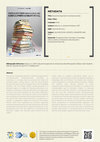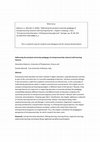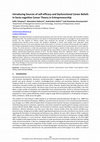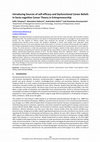Books by Alexandros Kakouris

Kakouris, A. (2024). Educational approach to entrepreneurship. Kallipos, Open Academic Editions. http://dx.doi.org/10.57713/kallipos-427, 2024
The present monograph attempts an educational approach to entrepreneurship. Entrepreneurship, ass... more The present monograph attempts an educational approach to entrepreneurship. Entrepreneurship, associated to innovation, is a concept that has attracted the interest of economic theory, among others, in the last three decades through the new economic paradigm that is the knowledge economy. The first chapter defines entrepreneurship as a teaching subject, i.e. suitable for teaching particularly in an academic environment. Relevant definitions and approaches are given which have changed from the original redefinition of entrepreneurship in the early 00s, where human behavior was considered as inherently influencing the phenomenon, to the present day, where entrepreneurship is considered as a mindset, a competence, design and science of the artificial. Policies which have supported and continue supporting entrepreneurship education are then presented as well as the entrepreneurial learning which underlies the behavior of the entrepreneur and is the main objective of entrepreneurship education. Chapter four discusses open problems that the subject matter poses to standard instructional design, and in particular on the articulation of learning objectives relating to knowledge, skills and attitudes. This chapter also includes a critical perspective on entrepreneurship education. Chapter five presents basic learning theories on which entrepreneurship teaching can be based in a consistent and understandable way for educators. Chapter six discusses informal and non-formal learning in entrepreneurship and how this has also influenced formal entrepreneurship education. Finally, chapter seven presents issues and methods of evaluating entrepreneurship education as well as capturing its overall impact on learners. The final chapter summarizes the conclusions of the volume and discusses the current and future perspectives of entrepreneurship education. The educational approach to entrepreneurship is of concern to educators at all levels, but at the same time it identifies the complex phenomenon of entrepreneurship by illuminating both its known didactic aspects and any less known ones.

Η επιχειρηματικότητα προτείνεται στις σύγχρονες κοινωνίες και οικονομίες γνώσης ως βασικός μηχανι... more Η επιχειρηματικότητα προτείνεται στις σύγχρονες κοινωνίες και οικονομίες γνώσης ως βασικός μηχανισμός ενδογενούς ανάπτυξης και κοινωνικής συνοχής. Κατά πόσο οι νέοι θα αναπτύξουν επιχειρηματική πρωτοβουλία θεωρείται πλέον, από τις σχετικές εκπαιδευτικές πολιτικές, ως κρίσιμος παράγοντας για την οικονομία και την ανάπτυξη και θέμα για εκπαίδευση και επαγγελματική συμβουλευτική. Γενικότερα, η καλλιέργεια του επιχειρηματικού τρόπου σκέψης αναμένεται να συμβάλλει προκειμένου οι νέοι να ανταποκριθούν στο σύγχρονο, μεταβαλλόμενο και ανταγωνιστικό περιβάλλον. Στην κατεύθυνση αυτή το παρόν κεφάλαιο συζητά τις επιχειρηματικές πεποιθήσεις ως γνωστικές δομές οι οποίες υπόκεινται της επιχειρηματικής πρόθεσης και συμπεριφοράς. Παρουσιάζονται τόσο η παραδοσιακή επιχειρηματική αυτό-αποτελεσματικότητα όσο και ένα νέο πλαίσιο πεποιθήσεων (ASKO) σχετικών με την επιχειρηματική επιτυχία. Τέλος, προτείνονται πρακτικές εφαρμογές των δύο αυτών γνωστικών εργαλείων στην εκπαίδευση και στη συμβουλευτική σε θέματα επιχειρηματικότητας.

Joint publication: https://www.academia.edu/12453027/Entrepreneurship_pedagogies_in_lifelong_learning_emergence_of_criticality
The present dissertation thesis originates from my personal motivation totheoretically discuss is... more The present dissertation thesis originates from my personal motivation totheoretically discuss issues of learning in order to enhance instruction of empirical entrepreneurship teaching as to become more reflective to learners. The need for reflection has been addressed in a variety of literature articles, hence, the present theoretical work is in accordance with the ongoing discussion of entrepreneurship education and its impact. The inclusion of the discipline among the key-issues of European lifelong learning generates new research questions about the advancement of its didactics in accordance with adult learning.
Entrepreneurship education exhibits a dramatic increase in higher education andnot exclusively in economic and business schools. Its academic adoption was first observed in U.S.A. and recently in Europe motivating its study from a theoretical point of view. The relative literature and discussions are presented in the first (introductory) chapter of the thesis. In the second chapter, I discuss how I teach entrepreneurial courses based on action learning following the experiential learning model of Kolb. Through cooperative groups, students develop a business plans for virtual companies that adopt significant innovation. They also attend lectures in the classroom on a weekly basis. Processes proposed by the Kolb model such as concrete experience, reflective observation, abstract conceptualization and active experimentation correspond to specific phases of instructional design.
Kolb's model is basically individualistic and does not explain the processes of reflection adequately. For these reasons, it has received significant criticism in the literature. In the third chapter of the thesis, key points of criticism are presented. We refer to key arguments of Phil Race, David Boud and Peter Jarvis who discuss weaknesses of Kolb's model and propose their own views. Phil Race challenges the linearity of the cyclic model, David Boud notes the lack of comprehension about the reflection mechanism while Peter Jarvis emphasizes that the lack of social environment in Kolb's experiential learning model makes the model inadequate. Empirical entrepreneurship teaching meets the arguments of these thinkers, particularly the remarks of Jarvis to incorporate elements of socio-cultural environment in teaching. Therefore, the question is "how could someone, who follows Kolb’s model, deviate from it and at what extent?". The “divergence” refers to the integration and discussion of the socio-political context in entrepreneurial courses. Such an "enrichment", and the expected reflection, is also possible to create learning disorders which the educator has to face. At the end of the third chapter, we refer to a radically different approach in learning, which is the school of critical thinking. This theory is inherently social and refers to addressing learning disorders, associated with disorientating dilemmas, which concern not only the trainees’ cognition but their beliefs or points of view as well. Key thinkers of this school suggest relevant teaching methods from which I adopt discourse (as to address critical questions) in the empirical part of this thesis. A series of critical questions under consideration has arisen in the current research of entrepreneurship. In the fourth chapter of the thesis, we propose a consistent “deviation” from Kolb's model during the process of reflection whenever learning disorders appear in entrepreneurial courses. The occurrence of such events is expected to depend on the attitude of the educator and his willingness to incorporate elements social environment in teaching (Jarvis), the characteristics of the learners and the adopted theoretical framework by the instructor (or the educational organization). However, a consistent deviation from experiential learning through critical reflection may lead not only to a "consensus" on specific issues but also require the review of the theoretical framework of education. Therefore, in some cases it may be possible to theorize and continue on the empirical cycle of Kolb and in others, the further continuation of the course may be impossible without radical changes at all levels. The critical reflection learning is an emancipator form of learning. The latter should be declared and consistently supported by the instructor through an educational contract with the learners prior to the divergence. The proposed teaching approach was empirically tested in two different groups of learners (a) adult educators who specialize in critical thinking and (b) a group of adults who receive career counseling from a Career Office. The first group exhibited the need for radical alteration of the theoretical framework, while the second group reached a "consensus" which allowed further experiential learning. Despite the two cases are indicative for the proposed teaching approach, further empirical testing is needed for conclusions. Current findings are summarized in the fifth chapter of the thesis.
Papers by Alexandros Kakouris

The International Journal of Entrepreneurship and Innovation, 2024
Current studies focus on supporting enterprises to mitigate the impact of crises on their economi... more Current studies focus on supporting enterprises to mitigate the impact of crises on their economic performance. However, further studies are needed to understand the challenges faced by rural agrifood enterprises in this context. The main objective of this study is to analyse the impact of food and raw material transport constraints on the perceived economic performance of agri-food smallmedium enterprises due to financial and pandemic crises with the influence of the following moderators: support mechanisms, digitalisation, and networking. A quantitative study was carried out on 404 rural Greek agri-food SMEs. Results indicate that easy access to finance and subsidies had a negative effect on the relationship between transport constraints and perceived economic performance. On the other hand, the implementation of digital tools, and networking opportunities improved the perceived economic performance of the enterprise during crises. According to the present findings, there is a need to review the existing processes of financial support for rural agrifood SMEs and to implement policies that will enhance the growth and sustainability of the agrifood sector amid global crises.
Academy of Management Learning & Education
This is a book review article. With A. P. Voudda.

with Daniele Morselli, in Sawang, S. (Ed.) "Entrepreneurship Education: A lifelong learning approach", Springer, pp. 35–58, DOI: 10.1007/978-3-030-48802-4_3, 2020
Entrepreneurship education has been initiated in higher education, especially Business Schools, a... more Entrepreneurship education has been initiated in higher education, especially Business Schools, as part of the curriculum but it is currently expanding to both pre-and post-university settings. It also encounters a split from academic environments to informal ones. In the crossroads of materializing educational needs in modern socioeconomic environments, this chapter aims to compare entrepreneurial teaching paradigms in different levels of the learners' lifecycle. Once learning theories are important in supporting educators to precisely develop the pedagogy, compatibility between different theories and different levels of education underpins the systematic provision of entrepreneurial programs across the learner's lifecycle with consistent outcomes and evaluations. Drawing upon Illeris' classification, the chapter addresses a selection of relevant learning theories to entrepreneurship: Dewey's learning-by-doing, Kolb's experiential learning, Lave and Wenger's communities of practice, Engeström's expansive learning and Mezirow's transformative learning. In a lifelong learning perspective, the chapter discusses which educational theories are better suited to the school level where the entrepreneurial programs are implemented. Thus, the chapter contributes the pedagogical perspective of entrepreneurship, for which research has been scant.

European Conference on Innovation and Entrepreneurship
A missing link between entrepreneurship education and career choices is how and when alumni decid... more A missing link between entrepreneurship education and career choices is how and when alumni decide to behave entrepreneurially. This question pertains to the impact of entrepreneurship education as envisaged in various educational policies. The vast majority of relevant studies have examined the concepts of entrepreneurial self-efficacy and entrepreneurial intention across courses and audiences worldwide. A recent trend adopts more systematic career development theories as the social cognitive career theory (SCCT). In this line, the present article provides new insights in SCCT models including the construct of dysfunctional career beliefs that represents an essential element in career decision-making. The article presents a small-scale quantitative research through a sample of Greek adults aimed to examine the relations between entrepreneurial intention and dysfunctional career beliefs as well as the informational sources of self-efficacy representing fundamental premises of SCCT. ...

with D. Morselli. In: Larios-Hernandez G.J., Walmsley A. and Lopez-Castro I. (Eds.) “Theorising Undergraduate Entrepreneurship Education”, Palgrave Macmillan, Cham, pp. 49-68, DOI: 10.1007/978-3-030-87865-8_4, 2022
After two decades of massive implementation of entrepreneurial courses in worldwide universities,... more After two decades of massive implementation of entrepreneurial courses in worldwide universities, and the diffusion of entrepreneurship in all learning settings, a theoretical reflection on teaching methods is timely for the tertiary level. The chapter focuses on teaching entrepreneurship to undergraduates under the Vygotskian sociocultural perspective. It introduces the basic concepts and a brief literature review on the social constructivism tenets in entrepreneurship education. Further, it illustrates two cases of instruction where the Vygotskian elements are met. Through these examples, the mediated act and the double stimulation principle are discussed. It is concluded that double stimulation has been the less exploited Vygotskian element in entrepreneurial teaching despite its potential to provide a promising avenue for educational research and progress in tertiary entrepreneurship education.

15th European Conference on Innovation and Entrepreneurship, Sep 15, 2020
One of the least explored domains in entrepreneurship education is the influence of teaching, of ... more One of the least explored domains in entrepreneurship education is the influence of teaching, of various kinds, on the alteration of attitude. This stream of research has been largely based on self-efficacy studies and the Theory of Planned Behaviour aiming to explain the determination of the entrepreneurial intention. Beyond these studies, the recently developed ASKO framework (Ability, Support, Knowledge, Opportunity) employs dialectics to classify entrepreneurial conceptualizations based on beliefs for the success factors of a new business. Four complementary conceptualizations (styles) emerge corresponding to habitual entrepreneurs, social venturing or corporate venturing, self-employment and knowledge-intensive start-ups for growth. Apart from the intention of graduates to establish new firms, the previous conceptualizations inform for the type of venture prospective entrepreneurs are inclined to. Based on entrepreneurship education provided to graduates in the Manizales Más entrepreneurial ecosystem in Colombia, the present study implements the ASKO framework to illustrate and discuss the influence of different instruction and content on perception shifts. The analysis includes the educators’ personal beliefs, the teaching approach and the content of the course. Inter-comparisons between different courses and educators are consistently developed and discussed. The results indicate that both the educator’s entrepreneurial beliefs (ASKO style) and the content of the course impact the learning outcome. Implications mostly pertain to the effective design of entrepreneurial courses and the assessment of programmes associated with educational policies and economic perspectives.
Journal of International Food & Agribusiness Marketing, Mar 2, 2023

Entrepreneurship Education and Pedagogy, Apr 20, 2021
This conceptual article aims to stimulate the educational discussion in entrepreneurship
by iden... more This conceptual article aims to stimulate the educational discussion in entrepreneurship
by identifying instructional differences among the three modes of entrepreneurship education, that is, the so-called “about,” “for,” and “through.” Based on a common understanding of instructional design, restricted to knowledge, skills, attitudes and inclusive to the vast majority of educators, differences in priorities, requirements, methods, and content for building up each separate mode are critically addressed. These differences reveal the nature and latent expectations for each instructional mode and possibilities for future studies. It emerges that the “about” mode follows the positivistic paradigm, the “for” follows the vocational education and training one, while the “through” is inherently transformational. Critical entrepreneurship education can be regarded as a distinct form closely related with the three previous modes in specific ways. It can be concluded that there is an inequality among the modes (“about”<“for”<“through”) regarding their revolutionary perspective (i.e., transformative at macro-level) associated with efficient confrontation of attitudes. Implications mostly pertain to future implementations and empirical research in the field.

European Conference on Innovation and Entrepreneurship (Vol. 18, No. 2), 2023
A missing link between entrepreneurship education and career choices is how and when alumni decid... more A missing link between entrepreneurship education and career choices is how and when alumni decide to behave entrepreneurially. This question pertains to the impact of entrepreneurship education as envisaged in various educational policies. The vast majority of relevant studies have examined the concepts of entrepreneurial self-efficacy and entrepreneurial intention across courses and audiences worldwide. A recent trend adopts more systematic career development theories as the social cognitive career theory (SCCT). In this line, the present article provides new insights in SCCT models including the construct of dysfunctional career beliefs that represents an essential element in career decisionmaking. The article presents a small-scale quantitative research through a sample of Greek adults aimed to examine the relations between entrepreneurial intention and dysfunctional career beliefs as well as the informational sources of selfefficacy representing fundamental premises of SCCT. The pilot findings show that "significant others", a dimension of dysfunctional career beliefs, influence the entrepreneurial career decision process as an extraneous personal parameter. Linear multiple regression analysis demonstrated that positive emotions, mastery experiences and the perceptions regarding significant others' influence in career decision-making significantly predicted entrepreneurial intention. It is also shown that influence from significant others moderates the relationship between positive emotions and entrepreneurial intention, that is, intensifying the previous relationship when influence of significant others is low and decreasing it when this influence is high. These findings are discussed in the context of entrepreneurial career decision making with implications to educational and career counselling practices.

Business & Entrepreneurship Journal, 2023
Entrepreneurship is suggested as a key-mechanism for endogenous growth and social cohesion in mod... more Entrepreneurship is suggested as a key-mechanism for endogenous growth and social cohesion in modern, knowledge-driven societies and economies. Whether the youth will develop entrepreneurial competencies and initiatives has been considered crucial for economic growth and development and a key-subject of education and career counseling. Despite an increasing body of theoretical and empirical literature which mainly emphasize the formation of entrepreneurial intention and the strengthening of entrepreneurial self-efficacy-usually as a result of some intervention-, the findings show deficiencies or relative ambiguity, in terms of explaining the complex factors (e.g. entrepreneurial mindset, dysfunctional beliefs) associated with entrepreneurial intention and behavior. The present conceptual paper presents a synthetic literature review aiming at a deeper understanding of entrepreneurial intention and behavior. Based on the emergence of new, more explanatory, models to predict entrepreneurial behavior we emphasize how relevant research could approach this topic through the lens of the Socio-Cognitive Career Theory-driven by self-efficacy, outcome expectations and goal-directed activitygiven that to date few studies have used this theoretical framework. We also suggest that the traditional entrepreneurial self-efficacy concept is investigated along with a new framework (ASKO) to measure beliefs regarding success of new ventures. ASKO typology traces a variety of different entrepreneurial mindsets within the person-environment dichotomy. Moreover, the potential contribution of dysfunctional career beliefs and locus of control in the formation of entrepreneurial behavior is examined. Career decision process and entrepreneurial career choices are highly complex and entail elements of various theoretical perspectives. The present literature review sheds light to our understanding of entrepreneurial career choices and suggests holistic in-depth research that will provide rich explanatory information on a wide range of behaviors. Finally, the present review provides opportunities to get insights regarding the nature and potential influence of support interventions in the context of entrepreneurship education and career counseling.

Business & Entrepreneurship Journal, 2023
The present conceptual article discusses non-cognitive aspects of entrepreneurial learning. Entr... more The present conceptual article discusses non-cognitive aspects of entrepreneurial learning. Entrepreneurs are known to undergo extreme experience phases during establishing their firms where peak experience, peak performance and flow counteract. As a result, increasing anxiety and stress may hamper their performance. Non-cognitive skills that consider simultaneously mental processes, emotions and spirit in connection with the human neurophysiological system in a holistic, human learning process, could appear more efficient in describing how entrepreneurial learning occurs in stressful situations. In the present discussion somatic learning education is suggested as a possibility to enhance entrepreneurial learning, creativity and performance in stressful situations. As non-cognitive entrepreneurial skills have been overlooked in the extant literature, the present discussion initiates a discussion for further research in the field. The concepts of holistic entrepreneurial learning, embodiment and somatic learning are described while their relevance to stressful business start-upping and entrepreneurial well-being is sought. The article concludes with relevant research questions for further examination.
The International Journal of Management Education, 2023
Educational theory driven teaching in entrepreneurship 1. Entrepreneurship education and entrepre... more Educational theory driven teaching in entrepreneurship 1. Entrepreneurship education and entrepreneurship pedagogy Unequivocally, entrepreneurship education has emerged as growing topic of importance over the last twenty years, given the volume of research publications in a wide range of journals (e.g.

European Conference on Innovation and Entrepreneurship
The question that motivates the present study is whether entrepreneurship educators confront the ... more The question that motivates the present study is whether entrepreneurship educators confront the context where entrepreneurship education is implemented. Recent studies indicate that homogenisation of entrepreneurial methods has occurred over time promoting a monolithic conception of innovation-driven start-ups, often technological, as a prototype for entrepreneurial courses’ outcomes. Nonetheless, entrepreneurship does not only accommodate ambitious start-ups for growth but also small firms that significantly contribute to employability and social inclusion. Social problems are also tackled. Innovation needs to be translated to different disciplines and social contexts of populations instead of the mere proliferation of a few innovative firms’ cases in classrooms. Concurrently, rapid changes in the business environment (crises) ask for reflections regarding the content of entrepreneurship from both educators and students. Thus, context and adjustment to contexts is a timely concern...











Uploads
Books by Alexandros Kakouris
http://www.diavlos-books.gr/product/914/ennoiologikes-proseggiseis-stin-epixeirimatikotita-kainotomias-
Entrepreneurship education exhibits a dramatic increase in higher education andnot exclusively in economic and business schools. Its academic adoption was first observed in U.S.A. and recently in Europe motivating its study from a theoretical point of view. The relative literature and discussions are presented in the first (introductory) chapter of the thesis. In the second chapter, I discuss how I teach entrepreneurial courses based on action learning following the experiential learning model of Kolb. Through cooperative groups, students develop a business plans for virtual companies that adopt significant innovation. They also attend lectures in the classroom on a weekly basis. Processes proposed by the Kolb model such as concrete experience, reflective observation, abstract conceptualization and active experimentation correspond to specific phases of instructional design.
Kolb's model is basically individualistic and does not explain the processes of reflection adequately. For these reasons, it has received significant criticism in the literature. In the third chapter of the thesis, key points of criticism are presented. We refer to key arguments of Phil Race, David Boud and Peter Jarvis who discuss weaknesses of Kolb's model and propose their own views. Phil Race challenges the linearity of the cyclic model, David Boud notes the lack of comprehension about the reflection mechanism while Peter Jarvis emphasizes that the lack of social environment in Kolb's experiential learning model makes the model inadequate. Empirical entrepreneurship teaching meets the arguments of these thinkers, particularly the remarks of Jarvis to incorporate elements of socio-cultural environment in teaching. Therefore, the question is "how could someone, who follows Kolb’s model, deviate from it and at what extent?". The “divergence” refers to the integration and discussion of the socio-political context in entrepreneurial courses. Such an "enrichment", and the expected reflection, is also possible to create learning disorders which the educator has to face. At the end of the third chapter, we refer to a radically different approach in learning, which is the school of critical thinking. This theory is inherently social and refers to addressing learning disorders, associated with disorientating dilemmas, which concern not only the trainees’ cognition but their beliefs or points of view as well. Key thinkers of this school suggest relevant teaching methods from which I adopt discourse (as to address critical questions) in the empirical part of this thesis. A series of critical questions under consideration has arisen in the current research of entrepreneurship. In the fourth chapter of the thesis, we propose a consistent “deviation” from Kolb's model during the process of reflection whenever learning disorders appear in entrepreneurial courses. The occurrence of such events is expected to depend on the attitude of the educator and his willingness to incorporate elements social environment in teaching (Jarvis), the characteristics of the learners and the adopted theoretical framework by the instructor (or the educational organization). However, a consistent deviation from experiential learning through critical reflection may lead not only to a "consensus" on specific issues but also require the review of the theoretical framework of education. Therefore, in some cases it may be possible to theorize and continue on the empirical cycle of Kolb and in others, the further continuation of the course may be impossible without radical changes at all levels. The critical reflection learning is an emancipator form of learning. The latter should be declared and consistently supported by the instructor through an educational contract with the learners prior to the divergence. The proposed teaching approach was empirically tested in two different groups of learners (a) adult educators who specialize in critical thinking and (b) a group of adults who receive career counseling from a Career Office. The first group exhibited the need for radical alteration of the theoretical framework, while the second group reached a "consensus" which allowed further experiential learning. Despite the two cases are indicative for the proposed teaching approach, further empirical testing is needed for conclusions. Current findings are summarized in the fifth chapter of the thesis.
Papers by Alexandros Kakouris
by identifying instructional differences among the three modes of entrepreneurship education, that is, the so-called “about,” “for,” and “through.” Based on a common understanding of instructional design, restricted to knowledge, skills, attitudes and inclusive to the vast majority of educators, differences in priorities, requirements, methods, and content for building up each separate mode are critically addressed. These differences reveal the nature and latent expectations for each instructional mode and possibilities for future studies. It emerges that the “about” mode follows the positivistic paradigm, the “for” follows the vocational education and training one, while the “through” is inherently transformational. Critical entrepreneurship education can be regarded as a distinct form closely related with the three previous modes in specific ways. It can be concluded that there is an inequality among the modes (“about”<“for”<“through”) regarding their revolutionary perspective (i.e., transformative at macro-level) associated with efficient confrontation of attitudes. Implications mostly pertain to future implementations and empirical research in the field.
http://www.diavlos-books.gr/product/914/ennoiologikes-proseggiseis-stin-epixeirimatikotita-kainotomias-
Entrepreneurship education exhibits a dramatic increase in higher education andnot exclusively in economic and business schools. Its academic adoption was first observed in U.S.A. and recently in Europe motivating its study from a theoretical point of view. The relative literature and discussions are presented in the first (introductory) chapter of the thesis. In the second chapter, I discuss how I teach entrepreneurial courses based on action learning following the experiential learning model of Kolb. Through cooperative groups, students develop a business plans for virtual companies that adopt significant innovation. They also attend lectures in the classroom on a weekly basis. Processes proposed by the Kolb model such as concrete experience, reflective observation, abstract conceptualization and active experimentation correspond to specific phases of instructional design.
Kolb's model is basically individualistic and does not explain the processes of reflection adequately. For these reasons, it has received significant criticism in the literature. In the third chapter of the thesis, key points of criticism are presented. We refer to key arguments of Phil Race, David Boud and Peter Jarvis who discuss weaknesses of Kolb's model and propose their own views. Phil Race challenges the linearity of the cyclic model, David Boud notes the lack of comprehension about the reflection mechanism while Peter Jarvis emphasizes that the lack of social environment in Kolb's experiential learning model makes the model inadequate. Empirical entrepreneurship teaching meets the arguments of these thinkers, particularly the remarks of Jarvis to incorporate elements of socio-cultural environment in teaching. Therefore, the question is "how could someone, who follows Kolb’s model, deviate from it and at what extent?". The “divergence” refers to the integration and discussion of the socio-political context in entrepreneurial courses. Such an "enrichment", and the expected reflection, is also possible to create learning disorders which the educator has to face. At the end of the third chapter, we refer to a radically different approach in learning, which is the school of critical thinking. This theory is inherently social and refers to addressing learning disorders, associated with disorientating dilemmas, which concern not only the trainees’ cognition but their beliefs or points of view as well. Key thinkers of this school suggest relevant teaching methods from which I adopt discourse (as to address critical questions) in the empirical part of this thesis. A series of critical questions under consideration has arisen in the current research of entrepreneurship. In the fourth chapter of the thesis, we propose a consistent “deviation” from Kolb's model during the process of reflection whenever learning disorders appear in entrepreneurial courses. The occurrence of such events is expected to depend on the attitude of the educator and his willingness to incorporate elements social environment in teaching (Jarvis), the characteristics of the learners and the adopted theoretical framework by the instructor (or the educational organization). However, a consistent deviation from experiential learning through critical reflection may lead not only to a "consensus" on specific issues but also require the review of the theoretical framework of education. Therefore, in some cases it may be possible to theorize and continue on the empirical cycle of Kolb and in others, the further continuation of the course may be impossible without radical changes at all levels. The critical reflection learning is an emancipator form of learning. The latter should be declared and consistently supported by the instructor through an educational contract with the learners prior to the divergence. The proposed teaching approach was empirically tested in two different groups of learners (a) adult educators who specialize in critical thinking and (b) a group of adults who receive career counseling from a Career Office. The first group exhibited the need for radical alteration of the theoretical framework, while the second group reached a "consensus" which allowed further experiential learning. Despite the two cases are indicative for the proposed teaching approach, further empirical testing is needed for conclusions. Current findings are summarized in the fifth chapter of the thesis.
by identifying instructional differences among the three modes of entrepreneurship education, that is, the so-called “about,” “for,” and “through.” Based on a common understanding of instructional design, restricted to knowledge, skills, attitudes and inclusive to the vast majority of educators, differences in priorities, requirements, methods, and content for building up each separate mode are critically addressed. These differences reveal the nature and latent expectations for each instructional mode and possibilities for future studies. It emerges that the “about” mode follows the positivistic paradigm, the “for” follows the vocational education and training one, while the “through” is inherently transformational. Critical entrepreneurship education can be regarded as a distinct form closely related with the three previous modes in specific ways. It can be concluded that there is an inequality among the modes (“about”<“for”<“through”) regarding their revolutionary perspective (i.e., transformative at macro-level) associated with efficient confrontation of attitudes. Implications mostly pertain to future implementations and empirical research in the field.
See details at https://www.mdpi.com/journal/education/special_issues/H50A7QEDLB
IGI Global
Editors
Sotiris Apostolopoulos, Neapolis University Pafos, Cyprus
Ivan Paunovic, Koblenz University of Applied Sciences, Germany
Bobby Macaulay, University of the Highlands and Islands, United Kingdom
Alexandros Kakouris, University of the Peloponnese, Greece
Call for Chapters
Proposals Submission Deadline: November 3, 2024
Full Chapters Due: January 5, 2025
Submission Date: January 5, 2025
The following is the timeline for the call and the subsequent publication of the book:
- March/April 2023 - Call Opens
- June/July 2023 - Submission of extended abstracts (up to 800 words) of the proposed case study - September 2023 - Decision and feedback on extended abstracts
- January 2024 - Full chapter/case submission
- February/March 2024 - Decision on case study submissions and comments for revisions
- May/June 2024 - Final submission and decision on the revised chapter/case - September 2024 - Publication of the book
The book will be co-edited by Ass. Prof. Alexandros Kakouris (a.kakouris@uop.gr), Prof. George Michael Klimis (gmklimis@panteion.gr) and Dr Christopher Moon (c.moon@mdx.ac.uk). Please feel free to contact either of them should you have any queries relating to the process. All submissions to be sent to casebook_creativity@telecc.org